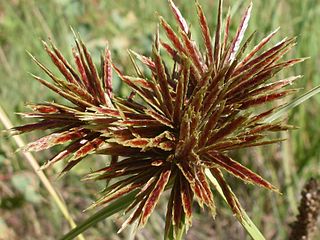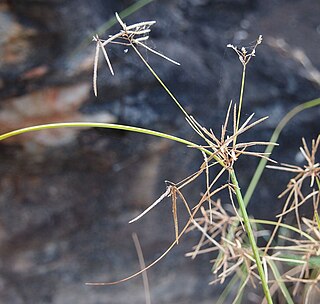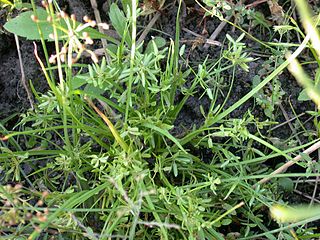
Cyperus papyrus, papyrus, papyrus sedge, paper reed, Indian matting plant or Nile grass, is a species of aquatic flowering plant belonging to the sedge family Cyperaceae. It is a tender herbaceous perennial, native to Africa, and forms tall stands of reed-like swamp vegetation in shallow water.

The little ringed plover is a small plover. The genus name Charadrius is a Late Latin word for a yellowish bird mentioned in the fourth-century Vulgate. It derives from Ancient Greek kharadrios a bird found in river valleys. The specific dubius is Latin for doubtful, since Sonnerat, writing in 1776, thought this bird might be just a variant of common ringed plover.

Cyperus is a large genus of about 700 species of sedges, distributed throughout all continents in both tropical and temperate regions.

Cyperus esculentus is a crop of the sedge family widespread across much of the world. It is found in most of the Eastern Hemisphere, including Southern Europe, Africa and Madagascar, as well as the Middle East and the Indian subcontinent. C. esculentus is cultivated for its edible tubers, called earth almonds or tiger nuts, as a snack food and for the preparation of horchata de chufa, a sweet, milk-like beverage.

Cyperus polystachyos, also known as Pycreus polystachyos, and also called manyspike flatsedge in the USA, or bunchy sedge, coast flatsedge, many-spiked sedge or Texas sedge in Australia, is a herbaceous species in the family Cyperaceae, widespread in tropical and subtropical areas around the world, sometimes extending its range into temperate regions.

Ceriagrion glabrum is a species of damselfly in the family Coenagrionidae. Its common names include common orange, common citril, common pond damsel, common waxtail, orange waxtail and gewone aljander. It is widespread in Africa, where it is found in habitats that are dominated by reeds.

Cyperus eragrostis is a species of sedge known by several common names, including tall flatsedge, nutgrass, tall nutgrass, umbrella sedge, chufa, Earth almond, zula nuts, edible galingale and pale galingale.

Cyperus squarrosus is a species of sedge known by several common names, including bearded flatsedge and awned flatsedge. It is found in wet environments in North and South America, Africa, Australia, southern Asia and Italy.

Cyperus laevigatus is a species of sedge known by the common name smooth flatsedge.

Cyperus pennatiformis is a rare species of sedge known by the common name coastal flatsedge. It is endemic to Hawaii, where it grows on the islands of Maui, Kauai, and Laysan. It is a federally listed endangered species of the United States.

Cyperus articulatus is an aromatic species of sedge known by the common names jointed flatsedge and priprioca. It has also been known as Guinea rush or adrue. It grows as a perennial herb. It grows in water or near it in rivers, streams, lakes, and swamps with a hyperhydrate or possibly tenagophyte growth pattern. It is widespread across tropical and subtropical regions in Africa, southern Asia, northern Australia, the southeastern United States, the West Indies, and Latin America. While it is closely related to highly invasive sedges such as purple nut sedge, priprioca is less prolific and competitive than its relative.
Cyperus laxus is a sedge species in the Cyperaceae. It is native to tropical regions of the Western Hemisphere and also to Africa. The species is reportedly naturalized in Assam and the Andaman and Nicobar Islands.

Cyperus alterniflorus, commonly known as umbrella flat-sedge, is a sedge of the family Cyperaceae that is native to Australia.

Cyperus compressus, commonly known as annual sedge, is a sedge of the family Cyperaceae that has a wide distribution throughout countries with warmer climates. It is found in tropical areas of Africa, Asia and the Americas.

Cyperus congestus, commonly known as dense flat-sedge or clustered flat-sedge, is a sedge of the family Cyperaceae that is native to southern Africa mostly in South Africa, Lesotho and Namibia.

Cyperus dactylotes is a sedge of the family Cyperaceae that is native to Australia.

Cyperus flaccidus is a sedge of the family Cyperaceae that is native to Australia.

Cyperus vaginatus, commonly known as stiff-leaf sedge or stiff flat-sedge, is a sedge of the family Cyperaceae that is native to Australia.
Cyperus zollingeri, commonly known as roadside flatsedge, is a sedge of the family Cyperaceae that is native to tropical areas of Australia, Africa and Asia.
Cyperus nduru is a species of sedge that is found across tropical Africa, including; Central African Republic, Angola, Republic of Congo, Democratic Republic of Congo, Cameroon, Malawi, Mozambique, Ghana, Nigeria, Guinea, Tanzania, Zimbabwe and Sierra Leone.
















